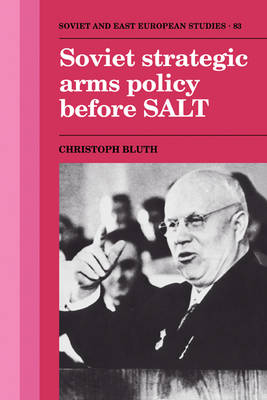Cambridge Russian, Soviet and Post-Soviet Studies
1 total work
In this book, Dr Christoph Bluth presents an original analysis of the build up of strategic forces from the death of Stalin to the SALT I agreement. The author outlines Soviet strategic arms policy, he identifies the principal interest groups involved and he studies a number of critical decisions taken in relation to strategic bombers, ICBMs, strategic nuclear forces based at sea, ballistic missile defence and the military uses of space. Strategic arms policy in the Khrushchev period exhibited a number of apparent paradoxes, which the author explains. As well as examining external threat assessment and wider foreign policy, he pays particular attention to the role of domestic factors such as Khrushchev's endeavours to shift resource away from military industries to agriculture and consumer goods production. The author is therefore able to demonstrate how domestic priorities and internal power struggles account for the seeming inconsistencies of Soviet military and foreign policy.
